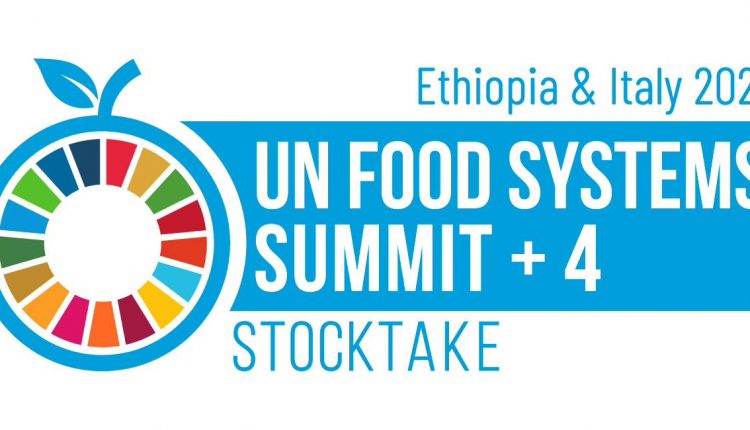Ethiopia’s leadership in agriculture and climate action earns hosting of UN Food Systems Summit Stocktake (UNFSS+4)
Addis Ababa, July 18, 2025 (FMC) — Ethiopia is preparing to host the Fourth Stocktaking Moment of the United Nations Food Systems Summit (UNFSS+4) from July 27 to 29, 2025, in Addis Ababa. The decision to hold this high-level global summit in Ethiopia’s capital reflects the country’s emergence as a continental leader in food systems transformation, climate resilience, and sustainable development.
Following the inaugural summit in New York in 2021 and the subsequent gathering in Rome in 2023, the 2025 Stocktaking Moment will convene heads of state, policymakers, global development institutions, farmers’ organizations, and private sector representatives. The summit aims to evaluate global and national progress since the original summit and chart future pathways toward inclusive and sustainable food systems.
Ethiopia’s selection as host is an international acknowledgment of its homegrown reforms, strong political will, and integrated national efforts to transform agriculture, nutrition, and climate action under the leadership of Prime Minister Abiy Ahmed.
Convergence of Food Systems and Climate Action
A significant factor in Ethiopia’s hosting role is its leadership in the Convergence Initiative, a collaborative platform jointly supported by the Ethiopian Government, the UN Food Systems Coordination Hub, and development partners. This initiative harmonizes Ethiopia’s Food Systems Transformation and Nutrition (EFSTN) program with its climate agenda, ensuring the country addresses both the Sustainable Development Goals (SDGs) and Paris Climate Agreement commitments in a unified approach.
In January 2025, a national stakeholder workshop involving over 120 experts from 61 organizations culminated in the release of the Convergence Action Blueprint (CAB) — a comprehensive strategy aligning food systems, climate resilience, and nutrition through coordinated policy and programmatic interventions.
A Model in Food Sovereignty and Agricultural Innovation
Ethiopia’s ongoing progress in agricultural modernization, especially achieving wheat self-sufficiency and pioneering digital agronomy, has garnered global recognition. The country is implementing 24 transformative solutions under the EFSTN, linked to more than 165 national interventions aimed at enhancing food security, livelihoods, and environmental sustainability.
In January 2024, Prime Minister Abiy Ahmed received the Food and Agriculture Organization’s (FAO) Agricola Medal, honoring Ethiopia’s strategic shift from wheat import dependency to domestic production and export readiness. The Consultative Group on International Agricultural Research (CGIAR) also recognized Ethiopia’s digital decision support tools at the 2024 Excellence in Agronomy Awards.
As the African Union’s champion country for the Comprehensive Africa Agriculture Development Programme (CAADP), Ethiopia has further committed to integrated agrifood system reforms aligned with the AU’s Agenda 2063.
Climate Leadership and the Green Economy
Since its launch in 2019, Ethiopia’s Green Legacy Initiative has been a cornerstone of the nation’s climate diplomacy and environmental rehabilitation efforts. With billions of trees planted nationwide, the program has supported reforestation, carbon sequestration, and improved rural microclimates vital for food production.
In 2024, Ethiopia’s climate leadership was highlighted at the Oslo Tropical Forest Forum. International organizations have acknowledged the country’s efforts to integrate food systems with climate targets through innovations such as early warning systems, regenerative agriculture, and renewable energy adoption.
The Convergence Action Blueprint further sets ambitious long-term targets for carbon neutrality, resilient agri-food value chains, and enhanced public-private partnerships via climate-smart technologies and innovative financing.
Addis Ababa: An International and Regional Hub for Global Dialogue
Hosting UNFSS+4 continues Ethiopia’s rise as a preferred venue for international diplomacy. Addis Ababa, home to the African Union headquarters and the United Nations Economic Commission for Africa (UNECA), is a trusted destination for global peace forums, investment summits, and climate dialogues.
Strategic investments in meetings, incentives, conferences, and exhibitions (MICE) tourism — including modern conference facilities and expanding transport connectivity — have enhanced Ethiopia’s profile as a continental convening force.
The government’s focus on infrastructure development, institutional capacity building, and digital governance further strengthens Ethiopia’s ability to lead and host major continental and global platforms.
Backed by the UN and Continental Institutions
Ethiopia’s hosting of UNFSS+4 is strongly supported by the UN Food Systems Coordination Hub, the World Food Programme (WFP), FAO, and other development partners, alongside regional bodies such as the African Union and African Development Bank. The decision reflects confidence in Ethiopia’s success in integrating climate-smart food systems with inclusive development strategies.
As the country prepares to welcome global leaders, UNFSS+4 offers Ethiopia a unique platform to showcase the effectiveness of its convergence strategy, reinforce multilateral partnerships, and inspire broader transformation across the African continent.

